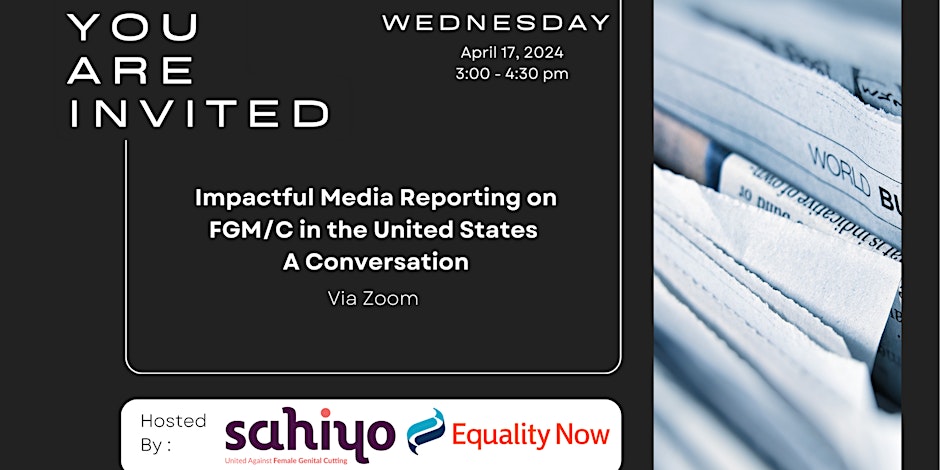Date: April 17, 2024
Time: 3:00 PM to 4:30 pm EST
Registration: https://bit.ly/FGMCMediaReporting
Join Equality Now and Sahiyo U.S. on Wednesday, April 17, 2024, at 3:00 PM EST, for a discussion that will explore the intricacies of reporting on female genital mutilation/cutting (FGM/C). This invitation extends to all media professionals — reporters, journalists, editors, and communication and content creators — who are looking to deepen their understanding and refine their approach to covering FGM/C. This event is particularly timely, given the current landscape where misinformation about FGM/C often leads to narratives that are uninformed, conflated, or misrepresented
The Need for Nuanced Reporting:
FGM/C is recognized as a human rights violation and poses unique reporting challenges. It is essential for media coverage to navigate these complexities with care in order to avoid inadvertently causing harm while staying true to the lived experiences of those impacted by FGM/C. This webinar seeks to address the topic by equipping attendees with the skills to report on FGM/C in a manner that is both sensitive and accurate.
Who Will Be Speaking?
The event will feature a panel of media and advocacy experts, including Senator Karen Kaiser, Emma Batha of Thomson Reuters Foundation News, journalist Milena Mikael Debass, and documentary filmmaker Milena Warns from Without Exception Films. The moderators of this event are Sahiyo Co-founder and U.S. executive director, Mariya Taher, and Equality Now Communications officer for North America, Mel Bailey.
Attendees will gain insights on:
- The prevalence and complexity of FGM/C within diverse cultural contexts in the U.S.
- The importance of engaging with survivors or those at risk with informed sensitivity.
- Strategies for using media platforms to raise awareness and educate the public on FGM/C.
- Analytical tools for covering related news, such as legal developments and community advocacy efforts effectively.
Why Attend?
This webinar represents an opportunity for media professionals to contribute meaningfully to the discourse on FGM/C. Through informed reporting, the media can play a pivotal role in supporting survivors and educating the public. This event is not just about reporting on a sensitive topic; it's about doing so in a way that respects the dignity of those impacted and contributes to positive change.
If you’re involved in media or interested in how media and communications can influence social issues thoughtfully, this event is for you. It's an opportunity to learn, ask questions, and consider the best practices for reporting on cultural practices that can lead to harm, such as FGM/C.
Register for the event here

